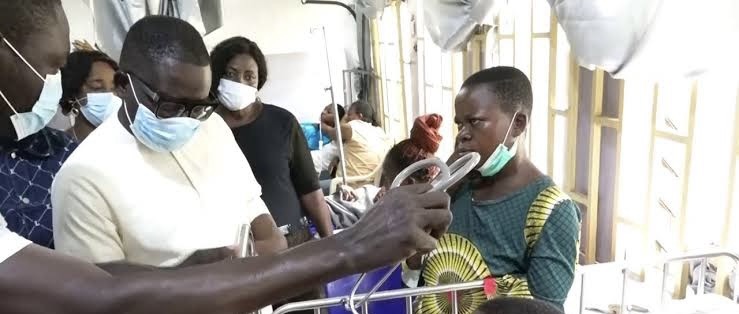The Edo State Government has taken delivery of 90 doses of anti-diphtheria vaccines in response to a recent resurgence of the disease, which claimed two lives last week.
Of the total consignment, 70 doses have already been deployed to the University of Benin Teaching Hospital (UBTH), the primary treatment centre for patients affected by the outbreak.
State Commissioner for Health, Dr. Cyril Oshiomhole, announced the development on Monday during a visit to UBTH, where he formally handed over the vaccines.
He noted that the government secured 70 doses from the National Centre for Disease Control (NCDC) and an additional 20 from the Delta State Ministry of Health, reflecting inter-state collaboration in addressing the emergency.
Dr. Oshiomhole, however, expressed concern over the pattern of the current outbreak, saying that even individuals with a history of full immunisation, including adolescents above five years old have contracted the disease.
This, he said, has prompted the state government to consult with the National Primary Health Care Development Agency for authorisation to expand vaccination coverage beyond the under-five age bracket to include older children, adults, and healthcare workers.
“We are working in collaboration with UBTH and the NCDC. We have spoken with the Director General of NCDC, who graciously released 70 doses of the anti-diphtheria vaccine.
“We also reached out to the Delta State Ministry of Health, which provided an additional 20 doses,” Dr. Oshiomhole said.
“We are closely studying the situation because it is alarming that some of the infected individuals had already received full immunisation.
“We are also looking into why a 14-year-old could come down with diphtheria. This calls for a reassessment of our vaccination protocols,” he added.
He further revealed that Governor Monday Okpebholo has approved the donation of hospital beds, fittings, and other medical supplies to support UBTH’s emergency centre.
“The governor is also considering covering the medical bills of affected patients.”
Welcoming the commissioner to the hospital, Professor Stanley Okugbo, Chairman of the Medical Advisory Committee at UBTH, and Dr. Fidelis Eki-Udoko, Deputy Chairman and Consultant overseeing the children’s emergency unit, commended the government for its rapid response.
They confirmed that all patients currently receiving treatment are responding well and urged the public to remain vigilant and seek prompt medical attention at the first sign of symptoms.
The hospital experts outlined the major signs of diphtheria to include: thick grey membranes covering the throat and tonsils, sore throat, hoarseness, swollen glands in the neck, difficulty or rapid breathing, nasal discharge, fever, chills, and fatigue.
They stressed that vaccination remains the most effective means of prevention, alongside good hygiene practices.
“Diphtheria spreads through direct contact with infected persons, typically via respiratory droplets from coughing or sneezing.
“Regular hand washing with soap and clean running water is a simple, yet vital preventive measure,” Dr. Eki-Udoko advised.


